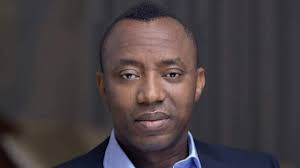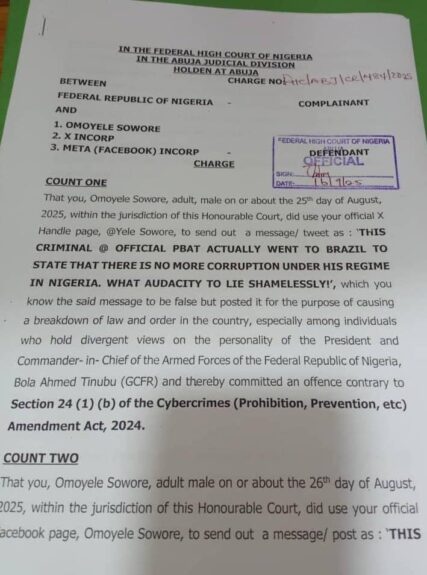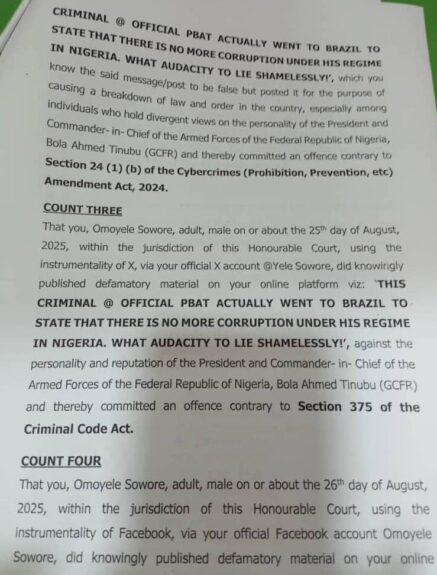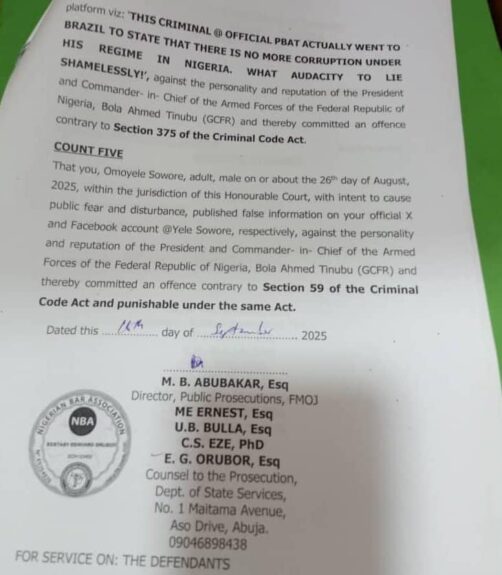
Daniel Otera
The Federal Republic of Nigeria has filed five charges against prominent activist Omoyele Sowore, alongside social media companies X Incorporated and Meta (Facebook) Incorporated at the Federal High Court in Abuja. The charges, under case number FHC/ABJ/CR/484/2025, revolve around posts by Sowore on his official social media accounts in late August 2025, where he accused President Bola Ahmed Tinubu of making false claims about the fight against corruption during his visit to Brazil. The charges allege that Sowore’s posts were false, defamatory, and designed to provoke public unrest.
The charge sheet, dated 16 September 2025 and signed by M. B. Abubakar, Esq, Director of Public Prosecutions at the Federal Ministry of Justice, lists the Nigerian Bar Association as involved. Other counsel include Me Ernest, Esq, U. B. Bulla, Esq, C. S. Eze, PhD, and E. G. Orubor, Esq, from the Department of State Services at No. 1 Maitama Avenue, Aso Drive, Abuja, with contact number 09046898438. The document is for service on the defendants.
The charges center on cybercrimes and criminal code violations related to defamatory posts on social media.
Count One: The first count states that on 25 August 2025, Sowore used his official X Handle (@YeleSowore) to post a tweet claiming, “THIS CRIMINAL @ OFFICIAL PBAT ACTUALLY WENT TO BRAZIL TO STATE THAT THERE IS NO MORE CORRUPTION UNDER HIS REGIME IN NIGERIA. WHAT AUDACITY TO LIE SHAMELESSLY!” The prosecution alleges that Sowore knew the message was false but posted it with the intent to incite a breakdown of law and order, especially among those with opposing views on President Tinubu. This allegedly violates Section 24(1)(b) of the Cybercrimes (Prohibition, Prevention, etc.) Amendment Act 2024.
Count Two: On 26 August 2025, Sowore allegedly used his Facebook account to post the same defamatory message, once again with the intent to cause public disorder, violating Section 24(1)(b) of the Cybercrimes Act 2024.
Count Three: The third count focuses on the defamatory nature of the post on X, where Sowore allegedly published false material that damaged President Tinubu’s reputation, thus committing an offense under Section 375 of the Criminal Code Act.
Count Four: Similarly, on 26 August 2025, Sowore allegedly posted defamatory content on his official Facebook account. This action also falls under Section 375 of the Criminal Code Act.
Count Five: Finally, Sowore is accused of spreading false information with the intent to incite fear and disturbance in the public. This was done through his posts on X and Facebook, and the charge alleges a violation of Section 59 of the Criminal Code Act.
Omoyele Sowore, born on 16 February 1971 in Ese-Odo, Ondo State, is a Nigerian human rights activist, journalist, and politician. He is best known for founding Sahara Reporters, an online platform dedicated to investigative journalism that has uncovered significant corruption within the Nigerian government. Sowore’s unyielding commitment to justice and accountability has made him a key figure in Nigeria’s fight for democracy and press freedom.
Sowore’s career transitioned from journalism to politics in 2018 when he founded the African Action Congress (AAC), offering an alternative to Nigeria’s entrenched political elites. He ran as the presidential candidate for the AAC in both the 2019 and 2023 general elections. Despite his increasing political presence, Sowore’s activism has often led to clashes with the Nigerian government.
In August 2019, Sowore was arrested by the Department of State Services (DSS) for organizing protests under the #RevolutionNow movement, which aimed to demand reforms in Nigeria’s political system. Sowore was charged with treason, cybercrime, and money laundering. His arrest and subsequent rearrest in December 2019 during a court session sparked local and international outrage, raising concerns about the Nigerian government’s disregard for judicial independence.
Sowore’s legal struggles did not end there. On 1 January 2021, he was arrested again while participating in a New Year’s Day protest, during which he was assaulted by police officers, resulting in injuries. This incident led to widespread condemnation from human rights organizations, highlighting the Nigerian government’s tendency to repress political dissent.
Despite years of legal battles, a significant turn came in February 2024 when the Nigerian government dropped all charges against Sowore. While this was a victory for civil rights, it underscored the challenges faced by activists in Nigeria. Sowore remains a vocal critic of the government, using his platform to advocate for systemic change.
Sowore’s legal troubles come at a time of increasing government crackdowns on dissent. His charges are tied to his outspoken criticism of the government, particularly in relation to President Tinubu’s remarks during his state visit to Brazil. The legal action has sparked a broader debate about the limits of free speech and the government’s role in regulating online content.
Sowore’s posts were aimed at discrediting President Tinubu’s claims about Nigeria’s economic reforms, particularly his efforts to tackle corruption. Sowore’s accusations have been classified as “false news” under Nigeria’s Cybercrimes Act. Critics argue that this legal framework is being used to suppress political opposition and dissent, especially when individuals like Sowore use their platforms to challenge government narratives.
The charges brought against Sowore reflect Nigeria’s increasing focus on cybercrime. The Cybercrimes (Prohibition, Prevention, etc.) Amendment Act 2024 was enacted to address the growing threat of digital offenses, including the spread of false or misleading information. The law criminalizes content that could incite unrest, protect public order, and prevent the harm caused by misinformation.
Legal experts have expressed concerns that while the law’s intent is to combat cybercrimes, its broad provisions could be misused to stifle political opposition. In addition, Nigeria’s Criminal Code Act, specifically Sections 375 and 59, criminalizes defamation and the dissemination of false information with the potential to incite public fear.
Critics argue that the law could be used as a tool to silence critics and political opponents, further limiting the space for free expression in Nigeria. Human rights groups have called for a careful balance between combating cybercrime and protecting citizens’ right to express their views.
The case has ignited debates about the balance between maintaining public order and safeguarding freedom of expression. Critics argue that laws like the Cybercrimes Act, along with proposed bills on hate speech and social media regulation, could be weaponized to suppress political dissent and curtail free speech. The 2021 Twitter ban, deemed unlawful by the ECOWAS Court, remains a glaring example of the government’s attempt to regulate online content.
As civil rights groups raise concerns, the Nigerian government maintains that these measures are necessary to safeguard national security and public order. However, the growing trend of criminalizing online speech has sparked fears of a chilling effect on activism and the press.
Cybercrime is emerging as one of the most significant threats to public safety and economic stability in Nigeria and across Africa. According to the INTERPOL Africa Cyberthreat Assessment Report 2025, cybercrime now accounts for over 30% of all reported crimes in Western and Eastern Africa. In Nigeria, the government has arrested over 1,000 individuals involved in financial fraud and cybercrime in the past year alone, highlighting its tough stance on cybercrime.
Despite these efforts, challenges remain, especially in prosecuting digital crimes due to the complexity of digital evidence and limited enforcement capacity. As internet access expands, the sophistication of cybercriminal networks increases, necessitating greater international cooperation to combat these threats effectively.



